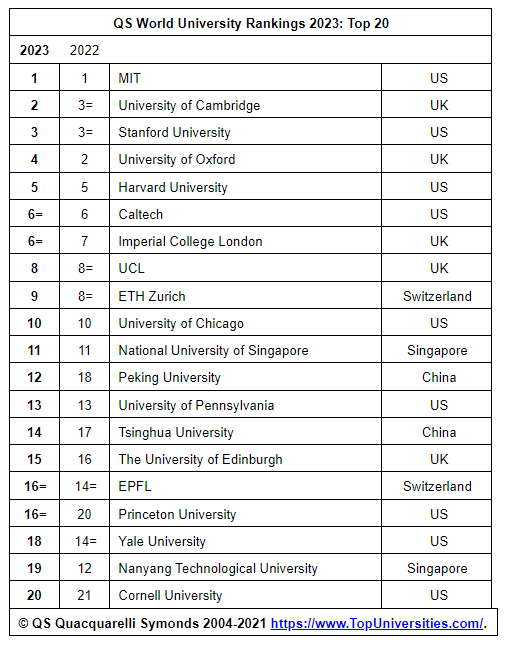QS Quacquarelli Symonds, global higher education analysts, released the nineteenth edition of the QS World University Rankings, featuring 1418 institutions across 100 locations. The results account for 16.4 million academic papers and 117.8 million citations received by those papers; they also reflect the expert opinions of 151,000 academic faculty and 99,000 employers. Massachusetts Institute of Technology (MIT) celebrates eleven years as the world's best university. The University of Oxford (4th) drops two places while the University of Cambridge (2nd) gains one.
Highlights
- USA: 103/201 ranked universities fall, 29 rise. Twenty-five are new entrants.
- UK: 48/90 universities declined, ten improved. Intensely collaborative: 55% of its research entails global collaborations vs 20% global average.
- Canada: 20/31 universities drop. McGill University (31st) is the new national leader.
- Australia retains five top-50 universities, yet is stagnating, with as many universities improving as declining.
- China (Mainland), the third most-represented higher education system (71 universities), is home to two world's top 15 universities for the first time ever: Peking University (12th) and Tsinghua University (14th).
- India: more improvements than falls; All top nine institutions rise.
- Asia's top university is the National University of Singapore (11th).
- Malaysia, South Korea and Indonesia improved while Japan and Thailand declined.
- ETH Zurich has remained continental Europe's best university for fifteen consecutive years.
- France's merged universities ascend in the table, with Université PSL (26th) breaking into the top-30.
- Universidad de Buenos Aires (67th) is confirmed Latin America's best. Hampered by low research impact scores, more of the continent's universities falling than rising.
- Arab Region's top university - King Abdulaziz University, 106th - reaches a record high.
- Africa's leader is the University of Cape Town (237th). Only five of the continent's universities
are among the top-500











